Regulation of p53 family member isoform DeltaNp63alpha by the nuclear factor-kappaB targeting kinase IkappaB kinase beta
- PMID: 20145131
- PMCID: PMC2963198
- DOI: 10.1158/0008-5472.CAN-09-2613
Regulation of p53 family member isoform DeltaNp63alpha by the nuclear factor-kappaB targeting kinase IkappaB kinase beta
Abstract
The p53 family gene p63 plays an instrumental role in cellular stress responses including responses to DNA damage. In addition to encoding a full-length transcriptional activator, p63 also encodes several dominant inhibitory isoforms including the isoform DeltaNp63alpha, the function of which is not fully understood. DeltaNp63alpha is degraded in response to DNA damage, thereby enabling an effective cellular response to genotoxic agents. Here, we identify a key molecular mechanism underlying regulation of DeltaNp63alpha expression in response to chemotherapeutic agents or tumor necrosis factor-alpha. We found that DeltaNp63alpha interacts with IkappaB kinase (IKK), a multisubunit protein kinase that consists of two catalytic subunits, IKKalpha and IKKbeta, and a regulatory subunit, IKKgamma. The IKKbeta kinase promotes ubiquitin-mediated proteasomal degradation of DeltaNp63alpha, whereas a kinase-deficient mutant IKKbeta-K44A fails to do so. Cytokine- or chemotherapy-induced stimulation of IKKbeta caused degradation of DeltaNp63alpha and augmented transactivation of p53 family-induced genes involved in the cellular response to DNA damage. Conversely, IKKbeta inhibition attenuated cytokine- or chemotherapy-induced degradation of DeltaNp63alpha. Our findings show that IKKbeta plays an essential role in regulating DeltaNp63alpha in response to extrinsic stimuli. IKK activation represents one mechanism by which levels of DeltaNp63alpha can be reduced, thereby rendering cells susceptible to cell death in the face of cellular stress or DNA damage.
Figures
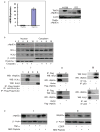
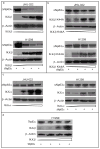
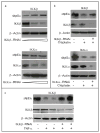
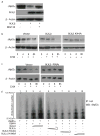
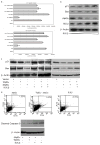
References
-
- Muller M, Schleithoff ES, Stremmel W, et al. One, two, three--p53, p63, p73 and chemosensitivity. Drug Resist Updat. 2006;9:288–306. - PubMed
-
- Strano S, Dell’Orso S, Mongiovi AM, et al. Mutant p53 proteins: between loss and gain of function. Head Neck. 2007;29:488–96. - PubMed
-
- Kaghad M, Bonnet H, Yang A, et al. Monoallelically expressed gene related to p53 at 1p36, a region frequently deleted in neuroblastoma and other human cancers. Cell. 1997;90:809–19. - PubMed
-
- Yang A, Kaghad M, Wang Y, et al. p63, a p53 homolog at 3q27–29, encodes multiple products with transactivating, death-inducing, and dominant-negative activities. Mol Cell. 1998;2:305–16. - PubMed
Publication types
MeSH terms
Substances
Grants and funding
LinkOut - more resources
Full Text Sources
Research Materials
Miscellaneous

